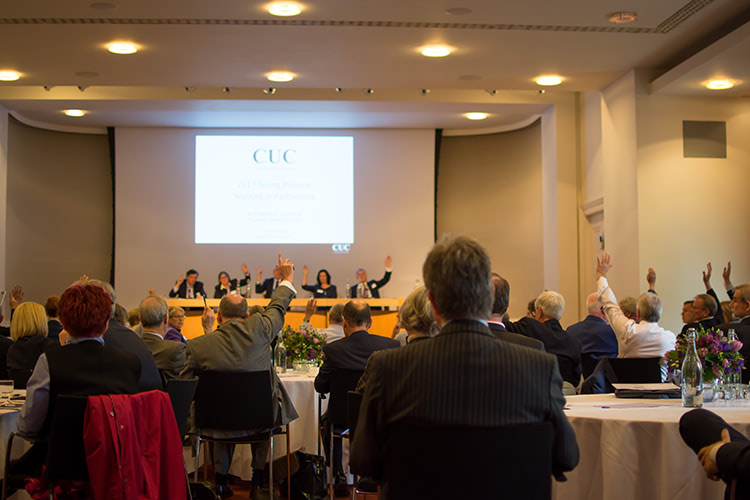Committee of University Chairs publishes report on vice-chancellor pay

Today, (6 Jun), the Committee of University Chairs has published a report on vice-chancellor pay. The report includes a voluntary new code for universities to follow, under the new guidance Universities will have to publicly explain their decisions about Vice-Chancellors’ salary packages.
University leaders will also be banned from sitting on committees that decide their remuneration, says the new Higher Education Senior Staff Remuneration Code, drawn up by the body that represents the heads of university governing bodies.
The code provides universities with guidance on how to determine “fair and appropriate” pay for the Higher Education sector and is designed to help create a more transparent and open system, amid concerns that some Vice-Chancellors are being paid too much for the job they do.
Latest CUC figures show the average increase in the basic salary of Vice-Chancellors increased by 2.3% in the 12 months up to January 2018 – 0.1% less than the previous year, bringing the average basic salary of Vice-Chancellors to £255,502. The average increase in basic pay in the same period for most other staff was 2.6%.
The figures also revealed that the number of university heads refusing or surrendering a pay increase or bonus has also increased from 13 to 30.
Under the new guidance, independent remuneration committees should consider a range of factors when making decisions about pay in order to “recruit, retain and motivate” the best people. These include levels of experience, the complexity of the position and external comparisons.
Universities must also publish an annual report in which it sets out clearly the salary of its Vice-Chancellor and the pay multiple showing how their earnings compares with the median earnings of the institution’s whole workforce. If the multiple is significantly above average – which will be published every year – it must explain why.
The voluntary code will be applied on a “apply or explain” basis. This means that universities which do not comply with the principles of the code will be required to publicly explain how their alternative arrangements meet the principles of the guidance.
Remuneration includes not only basic salary but also bonuses, expenses and other allowances, as well as the monetary value of benefits in kind including housing and cars.
Chris Sayers, the Chair of the Committee of University, said:
“Vice-Chancellors lead some of the most complex organisations in the UK. Their leadership has helped the UK higher education system become one of the best in the world in terms of teaching and research. To sustain these world-classes organisations, it is vital that institutions recruit, retain and reward those people that are responsible for that success.
“However, it is equally important that universities balance the need for recruiting the best talent with the need to demonstrate value for money and that is why we have published this guidance. We are confident the new code will promote more transparency and improve the public’s understanding of and confidence in how decisions around pay are made.”
 Sam Gyimah, the Universities Minister, said:
Sam Gyimah, the Universities Minister, said:
“Universities receive significant amounts of public funding, so it is only right that their senior staff pay arrangements command public confidence and deliver value for money for both students and taxpayers.
“I welcome the publication of the CUC Higher Education Senior Staff Remuneration Code as an important step in ensuring that senior staff pay in Higher Education is fair, justifiable and transparent. I am pleased the new code includes a ban on vice-chancellors sitting on the committees that set their pay. We have also taken concrete action to address excess pay, giving the Office for Students powers to tackle this issue if universities do not take action.”
“I am delighted to see concrete action being taken on vice-chancellor and senior staff pay, in particular the inclusion in the new code of a ban on vice-chancellors sitting on the committees that set their pay.
“Universities receive significant amounts of public funding, so it is only right that their senior staff pay arrangements command public confidence and deliver value for money for both students and taxpayers.”
 Nicola Dandridge, the Chief Executive of the Office for Students said,
Nicola Dandridge, the Chief Executive of the Office for Students said,
“We are expecting all higher education providers to justify how much those who lead their organisations are paid.”
Department for Education Spokesperson:
“We welcome this code and are clear that universities should deliver value for money for both students and taxpayers, so it is only right that their senior staff pay arrangements are justifiable and transparent. We have also taken concrete action to address excess pay, giving the Office for Students powers to tackle this issue if universities do not take action.”
The code, which applies to universities in England, was drawn up following consultation with the sector. In total, 76 of the 162 higher education institutions in the UK in receipt of public funding via one of the UK funding councils responded to the consultation, plus 13 other bodies and individuals.
The overwhelming majority of respondents – 91% – agreed that a voluntary code was the most effective way to address the issue of Vice-Chancellor pay.

Responses